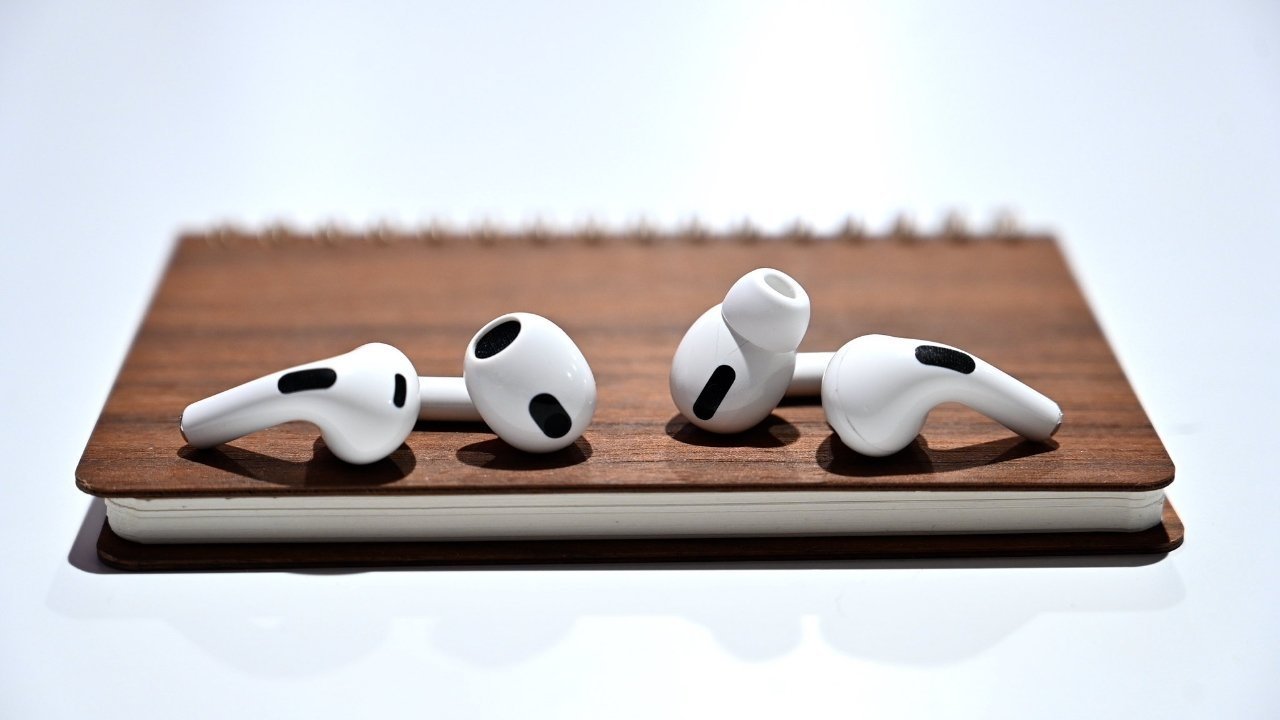Camera-equipped AirPods coming in 2026, lighter AirPods Max in 2027
A new report from a reliable leaker suggests that the AirPods line will see IR cameras added next year, with an update to the AirPods Max waiting until 2027.

Apple's AirPods line could see some major new features in their next iterations.
Analyst Ming-Chi Kuo has reiterated a June prediction that Apple's AirPods line would gain cameras, potentially as an alternative to the development of smart glasses. In his latest report, the frequently-reliable Kuo says the cameras in AirPods would be infrared (IR) cameras.
These would enter production sometime in 2026 and could be used to help direct users to a destination. The computer vision information gathered from the IR-equipped AirPods could also be passed on to other devices.
Such future AirPods could also pass on data to assist the Apple Intelligence engine on an iPhone. The AirPod cameras could add Visual Intelligence information to the iPhone while still in the user's pocket, for example.
It has also been rumored that a future update to the AirPods Pro 2 or a future third-gen AirPods Pro would add heart rate monitoring via a new H3 chip. This would be similar to an existing feature in the Powerbeats Pro 2.
There has also been speculation that the AirPods could gain a live translation feature with the arrival of iOS 19 this fall. In addition to providing a translation into the user's native language, a response could use an iPhone's speakers to provide a live translation back -- enabling a conversation.
Lighter AirPods Max
Kuo has also reported that the AirPods Max will get a significant hardware update in 2027. This would involve a rethink of the over-ear headphones to lighten the overall weight of the product.
AirPods may not see significant updates until 2026 (aligning with my earlier prediction that IR camera-equipped AirPods would enter mass production in 2026). A lighter version of the AirPods Max is expected to enter mass production in 2027.
AirPods2026-- (Ming-Chi Kuo) (@mingchikuo)
The new version of Apple's over-ear headphones would enter mass production sometime that year. If true, this could signal the arrival of a new model in time for the holiday season that year.
Apple added support for lossless audio and low-latency audio to the USB-C version of AirPods Max in April as part of the iOS 18.4 and macOS 15.4 releases. The update also added support for Personalized Spatial Audio.
The addition of lossless audio to AirPods Max requires users to use the USB-C to 3.5mm audio cable or a USB-C to USB-C cable. Audio delivered wirelessly to the AirPods Max will still be lossy.
Any reduction in the weight of the new AirPods Max model would be welcomed by future buyers. The current version weighs 13.6 ounces, or 384.8 grams.
Rumor Score: Possible
Read on AppleInsider

Comments
My question is this: if it turns out to be IR sensors for medical purposes , and right before they come out, Kuo says “yeah… what I meant by ‘cameras’ was IR sensors for monitoring your temperature,” is everybody going to count this currently ridiculous prediction as suddenly “right,” and say that justifies the weird “frequently reliable” label?
That said, cameras in AirPods seem unlikely to me. So did AirPods, at one time. There'd be no problem with believing that Apple is working on cameras in AirPods, just for drill. But I can't see any practical value in them.
Unless maybe the infra-red deal is to give Daredevil navigation ability to the sight-impaired. In the sci-fi world, this would have AI describing the environment to the user to guide their steps. A self-contained version of the visual guide Sunny in the bad Sight Unseen TV show. Now that could be too cool.
In a more practical application it might be to provide whistles and clicks to objects surrounding the user's head on a swivel.
Or combine a LASER (!) in each AirPod with an H12 chip to scan the area and feed the info to Apple Vision Pro v7 for a picture superior to Gen 1 NVGs (NODs to the youngsters) !
Though I seriously doubt that's the purpose. If an actual thing, I'd say it would be a proof of concept more than a potential actual product. Like an SPO2 sensor in a Watch. Ok one of those things is not like the other. But it would be so cool.
In Kuo's case, there's a pretty clear pattern of predictions made, then repeatedly modified with new predictions that change dates and details of what's expected. Hence my comment above about the prediction eventually changing from IR camera to IR sensor. Are several wrong guesses on a subject before a correct one counted in the average, or just the correct one? What about predictions for a device or feature to come out in a given year, then changed to the next year, then changed to the year after that, and the thing hasn't materialized? Apple rarely makes product announcements in the negative, so that could go on for a pretty long time, like the folding iPhone has. If they never produce the folding phone (or cameras on AirPods), does a prediction that they will ever get counted as wrong, so long as Apple never actually announces that they're not going make that?